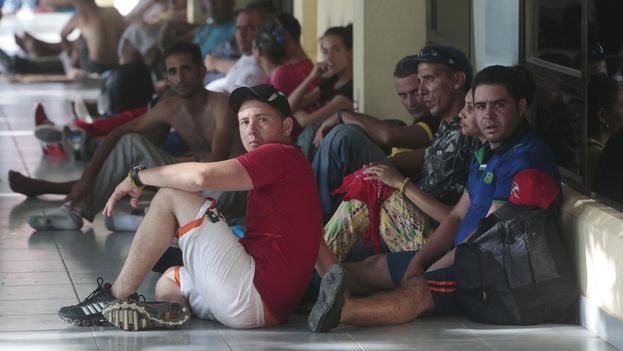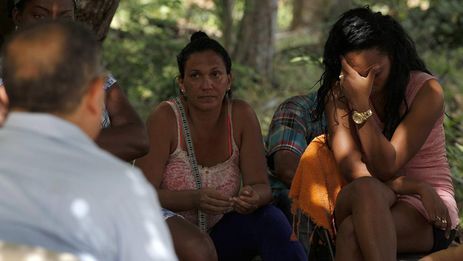
![]() 14ymedio, Mario J. Penton, Havana/Miami, 14 January 2017 – Yeny Varela cried bitterly this Thursday when she heard on national television about the immediate end to the wet foot/dry foot policy.
14ymedio, Mario J. Penton, Havana/Miami, 14 January 2017 – Yeny Varela cried bitterly this Thursday when she heard on national television about the immediate end to the wet foot/dry foot policy.
Repatriated to Cuba from Mexico after a long month-and-a-half trip from Ecuador in 2014, and after raising the necessary funds to leave the country again, her hopes of escape from the Island were ruined.
“I did everything to get to the United States where I have my elderly aunt and uncle. I went to the embassy, and they denied me a visa, I walked from Ecuador, and the Mexicans deported me, the last thing I had managed was a work contract in Mexico for which I paid thousands of dollars, and now I have lost everything,” she laments.
At 32 years of age, this young Havanan believes that the best years of her life are behind her.
“And now where do I go?” she says.
“They (the US government) are doing that because they believe that they are going to force a change, but it’s not going to happen,” she says. Although everyone is “sick” of that system, no one can protest because “they disappear you,” she says.
“Do you really believe they are going to give you a visa at the embassy? No one believes that. Don’t you realize that once someone has a visa he’s going to stay?” she adds.
Varela is not the only one dressed up with no place to go. In Villa Clara, Rosa, age 26, had sold her house and all her belongings to begin the dangerous trip through Guyana.

Her intention was to make the trip that thousands of other migrants have made in recent years to get to the southern border of the United States. After the immigration policy change, she is “devastated.”
“Our intent was to leave the country in order to live a little better. There are no opportunities here,” she explains. The Villarena does not plan, however, to go to the United States embassy to seek political asylum.
“I don’t involve myself in politics, that doesn’t interest me. I wanted to leave Cuba for economic reasons,” she explains.
Now she will have to start again from scratch. Meanwhile she decided to live with her mother.
Not only in Cuba were migration plans cut short. Throughout the continent hundreds of Cubans who were headed to the United States border have seen their plans thwarted.
“I never get involved in politics at all, but Obama has been worse than Pontius Pilate, seven days from leaving the presidency, it was not for him to have done such a thing,” says Maria Isabel, a Cuban who lives in Argentina and was preparing her trip to the United States.
“I have left everything behind. I was just taking a small step here in order to continue my journey,” she says.
According to the Cuban, who spent three months awaiting papers to continue to Mexico, the most misguided thing about the Obama administration’s decision is that it “tackles the consequences but not the causes.”
“How many people have risked or lost their lives? The degree of despair and frustration is so great that we can only cry,” she laments.
The latest statistics from the US Office of Citizenship and Immigration Services calculate that 56,406 Cuban citizens benefitted in the last fiscal year from the wet foot/dry foot policy.
After the resumption of relations between Cuba and the US, a migratory crisis unfolded which had regional repercussions when several thousand Cubans were stranded in Central America after Nicaragua refused to permit the islanders to pass.
With the later closure of the Costa Rican and Panamanian borders, the crisis spread to Colombia and Ecuador when those countries took steps to prevent mass migration from the Island. Two “air bridges” arranged with Mexico allowed the evacuation of the Cubans; however, since the departure of the planes from Panama in May, hundreds of other migrants continued arriving.
More than 80 Cubans on their way to the United States are in a hostel run by Caritas, a non-governmental organization tied to the Catholic Church.
One of them, Andres, says that “Obama is abominable” and that they did not expect it.
His situation was apparently made worse by the Immigration General Director’s statements only a few hours earlier that Cubans must leave the country.
However, the migrants being sheltered by Caritas have the support of the Catholic Church, which will intervene to prevent their deportation, as explained by Deacon Victor Luis Berrio, head of the organization.
At least those in Panama have protection, says Yuniel Ramos, who together with another 40 Cubans is continuing his journey through Honduras to get to the American border.
“They will have to do something with us because Cuba won’t take us back,” he adds.
But the doors to the United States are now closed for Cubans.
Translated by Mary Lou Keel
